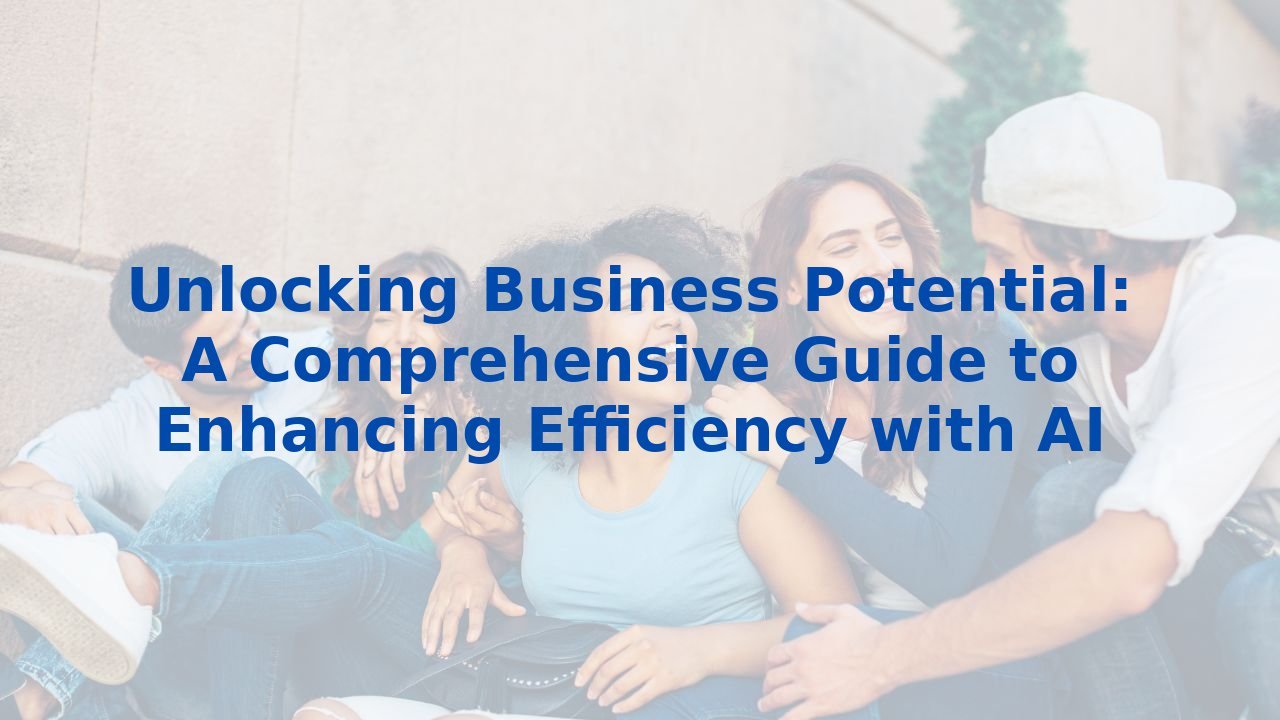Unlocking Business Potential: A Comprehensive Guide to Enhancing Efficiency with AI
Unlocking Business Potential: A Comprehensive Guide to Enhancing Efficiency with AI
In today's rapidly evolving business landscape, the quest for efficiency is more urgent than ever. Companies are turning to Artificial Intelligence (AI) to not just stay afloat, but to thrive. By infusing AI into various processes, organizations can unlock immense potential that goes beyond simple automation. Let’s explore how AI enhances business processes, the benefits it brings, and the pivotal role training plays in this transformation.
Understanding AI Process Optimization
AI process optimization is not merely a trend; it’s a strategic approach to business management. At its core, it leverages machine learning and data analysis to refine operations. This process involves more than just automation; it emphasizes making informed decisions that cut costs, reduce errors, and boost productivity.
Key Business Processes Enhanced by AI
1. Process Discovery
One of the foundational aspects of optimizing business processes is the ability to discover inefficiencies. AI excels at process mining, which analyzes data from system logs to highlight bottlenecks. Imagine a scenario where businesses can visualize their workflows, identify pain points, and re-engineer their processes accordingly. This kind of insight is invaluable.
2. Process Automation
Automation is where AI truly shines. By offloading high-volume tasks, companies can redirect their workforce to engage in more strategic initiatives. For instance, Intelligent Document Processing (IDP) uses AI to convert documents into structured data seamlessly, eliminating manual intervention. Robotic Process Automation (RPA) takes this further, allowing businesses to automate data entry tasks, thus reducing human error and freeing valuable time.
3. Process Management
AI doesn’t stop at automation; it also plays a crucial role in managing processes. Continuous monitoring via AI allows organizations to keep an eye on operational metrics in real time. This capability means businesses can anticipate issues before they escalate, ultimately providing a smoother operational flow and enhancing agility.
4. Process Improvement
With data-driven insights at their disposal, organizations can continuously refine their business processes. AI facilitates predictive modeling and root cause analysis, empowering managers to make adjustments based on historical data and forward-looking simulations. This iterative improvement approach creates sustainable growth while aligning operations with evolving industry standards.
Benefits of AI for Improving Efficiency
1. Enhanced Decision-Making
AI provides a treasure trove of insights that empower leadership to make informed choices. With the ability to reveal trends and potential impacts, decision-making becomes not just faster, but more precise.
2. Improved Operational Efficiency
Proactive anomaly detection is a game changer. By identifying potential risks early on, AI solutions help prevent issues from snowballing into larger problems, thereby safeguarding productivity.
3. Increased Productivity
A pivotal benefit of AI is how it unleashes human potential. By handling repetitive and mundane tasks, AI allows employees to engage with more creative and impactful work. Consequently, productivity skyrockets while the likelihood of errors diminishes.
4. Enhanced Customer Experience
In an age where customer experience can make or break a brand, AI has a critical role to play. By analyzing customer interactions and feedback, businesses can optimize their service offerings to meet clients' demands effectively. AI-driven insights lead to more personalized experiences and quicker resolutions, building stronger relationships with customers.
The Role of Employee Training in AI Integration
Despite the technological marvels that AI offers, its success hinges on one element—human expertise. Training employees to embrace AI tools is not just beneficial; it’s essential.
1. Understanding AI Capabilities
To leverage AI effectively, employees must comprehend its capabilities and limitations. Insightful training provides a foundation for understanding how to utilize these systems to their fullest potential.
2. Effective Implementation
Proper training transitions AI from a theoretical concept to a practical tool. Employees equipped with the necessary knowledge can implement AI solutions effectively, ensuring they deliver on their promises.
3. Adaptability
AI is ever-evolving, and so are the business challenges we face. Trained employees are more agile and adaptable, ready to pivot and embrace new technologies as they become available, keeping the organization competitive.
Conclusion
AI serves as a transformative force in today’s business world. By enhancing process discovery, automation, management, and improvement, organizations can significantly boost their efficiency. The fusion of AI into core processes fosters a culture of decision-making founded on data, increases productivity, and elevates the customer experience. However, the true power of AI comes to life only when paired with employee training, ensuring that the workforce can navigate and maximize these advancements. As we journey through an increasingly complex market, those who integrate AI effectively will find themselves not just surviving, but thriving.
For more insights into harnessing AI effectively, consider exploring [Complete AI Training](https://completeaitraining.com/) for comprehensive resources and training solutions.



